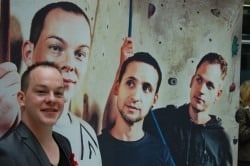The nationwide campaign for World Aids Day began on Monday. Motto: "Live positively together - but safely!" Our HIV-positive role model Markus is also showing with two friends Face for openness and against discrimination. We spoke to him shortly before the launch of this unique campaign
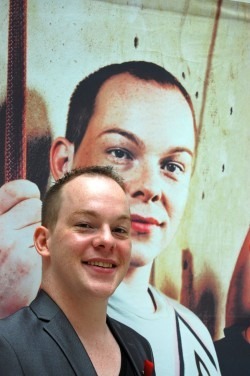
There has never been anything like it before: in this year's campaign for World Aids Day (1 December), people with HIV are talking about their own lives in order to combat discrimination. Motto "Living positively together - but safely!" The whole thing is a joint campaign by the Federal Centre for Health Education (BZgA), the German AIDS Service Organisation (DAH) and the German AIDS Foundation (DAS). Federal Health Minister Philipp Rösler (FDP) gave the starting signal today in Berlin.
Shortly before that, we had a meeting with our openly HIV-positive Role model Markus spoken. He is making it big in the campaign with his friends Pascal and Sebastian. (Find out more about the campaign and the other HIV-positive people taking part at aidshilfe.de and on the interactive website www.welt-aids-tag.de)
Hello Markus, you're facing a lot of media hype. How are you feeling?
Tingly! When I imagine that from now on I'll be hanging on huge posters at bus stops all over Germany, I feel a bit queasy. But the good news outweighs the bad.
Why are you taking part?
For once, this campaign doesn't feature celebrities in front of the camera, but positive people who have something to say on the subject. ICH WEISS WAS ICH TU (I KNOW WHAT I DO) started with this, and now it's also available on a larger scale for World Aids Day.
What is the message?
We want to show that people don't have to be afraid of us. To take away people's fear, positives have to go public themselves. Because if you can't see something, you can't talk about it. Maybe one day there will be so many positives in the public eye that it will become totally boring?
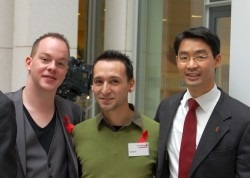
What do you think of your poster motif?
Courageous!
Brave of you or of your friends?
From all of us. I was quite shocked at first that it said "I have HIV" in such bold letters. To be honest, I hadn't imagined it like that. Now I hope that the poster is just as shocking for other people as it was for me! (laughs) In the sense that it makes them bang and they say: I'll go to the website and find out more.
It must be particularly exciting for your two friends Pascal and Sebastian.
Absolutely! The only thing that stops them from going crazy is that they are not the main character. (laughs)
How did it happen that you were photographed in front of a climbing wall?
That was Sebastian's idea. The climbing centre is intended to show the theme of friendship: that people do things together and can rely on each other. When climbing, one person has to hold the other. And then, of course, it should also show that you can also be fit as a positive person.
The poster says: You thought long and hard about who you could tell about your infection. What were you afraid of?
From exclusion. And unfortunately, quite a lot of people who I thought were friends did indeed drop out - they simply stopped calling. But my real friends stayed, of course. They asked me really cute things: "Can we do your laundry?" or "Can we bake you a loaf of bread?" They wanted to support me somehow - that was cool.
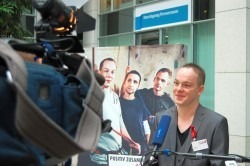
Have you also experienced negative reactions in the gay scene?
Unfortunately, yes. After I was seen as a role model in ICH WEISS WAS ICH TU, there were people who no longer wanted to shake my hand. I've also been told: "You Aids faggot don't deserve any better." You have to imagine gay people saying that! And there were two people who spread the word that I'd had unprotected sex with them to infect them. That's how a few people can stir up hatred towards positive people.
What is behind it?
People become mean out of fear. They have no idea how you can get infected. Some still believe that you can get HIV from a straw in a bottle of cola. So they're not rejecting me as a person, they're trying to push HIV away.
How often do you experience this?
I would say: 80 per cent of the reactions are positive, 20 per cent negative - which is still a lot. But you can't let that throw you off course. Through my public presence, I want to help prevent positive people from being criticised.
And now you're telling the whole country that you're positive!
Yes, every rube can see that now. (laughs) But if you can achieve something with it, then that's the right thing to do. A supermarket cashier told me the other day that she'd seen me on TV and thought what I was doing was great. So, as far as I'm concerned, I'm ready to go.
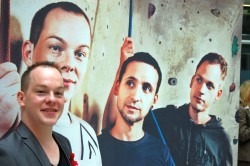
Do your work colleagues know?
Some already have. And I told a colleague about it, who I know will pass it on. That way, it's now a rumour - and when the posters go up, it will be confirmed. That saves me work.
Aren't you actually afraid of being showered with dripping pity in public now?
No, because I don't give people the choice. If a reporter looks sadly into my eyes, I tell them very quickly: "Watch out, that's exactly what we don't want. We want to show that we are strong!" And we want to protect those who are not strong.
Back then you were in the IWWIT interview said: I don't want my life to revolve mainly around HIV. Have you given up on that now?
(laughs) I've actually given up that statement because it would no longer be credible. But my friends always get me out of the topic and make sure that the rest of my life doesn't fall short.
(Interview and photos: Holger Wicht)
